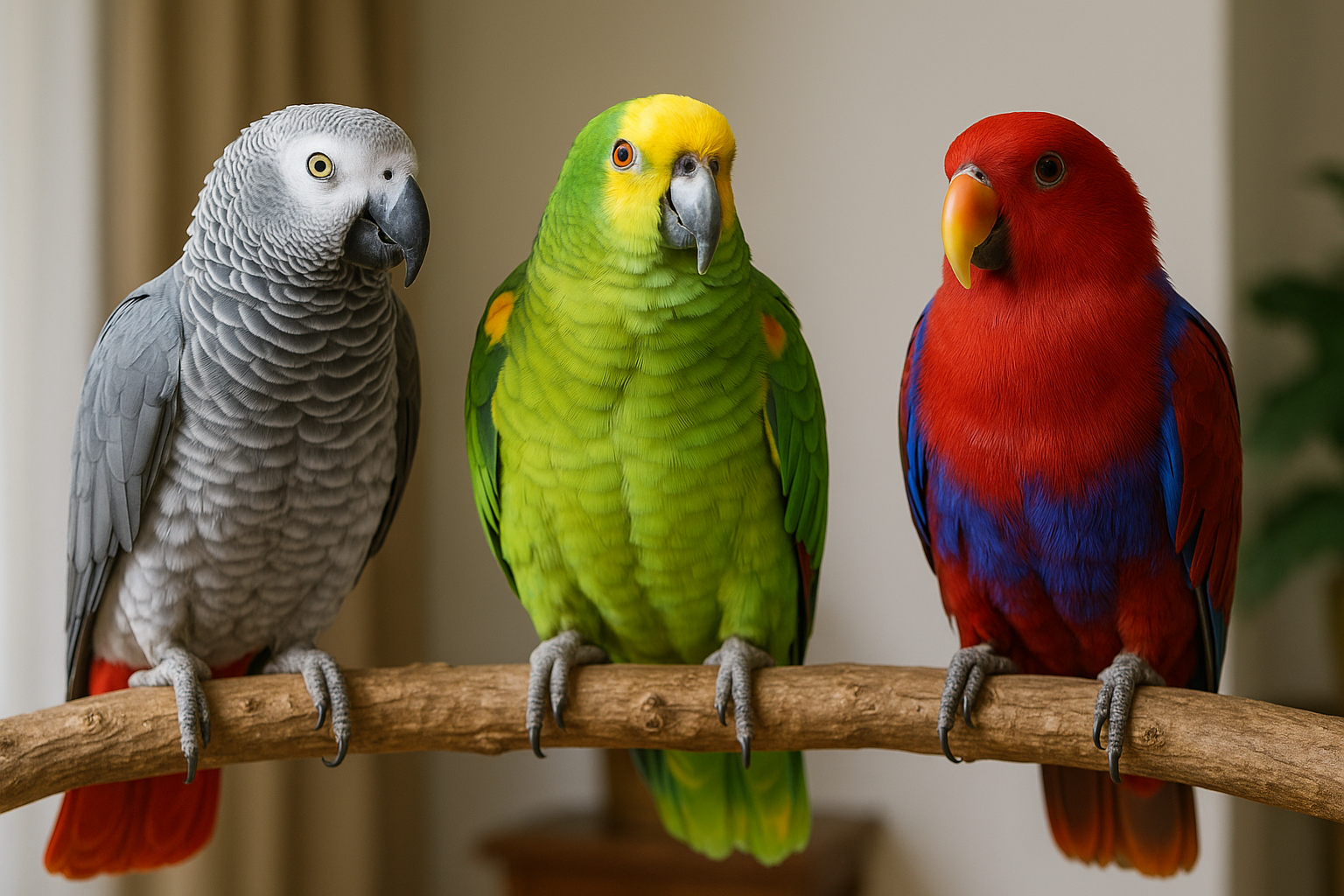African Grey (Psittacus erithacus), Amazon (Amazona spp.), and Eclectus (Eclectus roratus) parrots are among the most intelligent and emotionally complex exotic birds kept as pets in the United States. Known for their striking colors, ability to mimic human speech, and deep social bonds, these parrots require more than just a cage and food—they need commitment, structure, and thoughtful care.
Why These Parrots Are Unique Companions
These species are often compared to toddlers in terms of intelligence and emotional needs. Their lifespans can reach several decades, meaning adopting one is a long-term commitment that should not be taken lightly.
Daily Interaction and Social Enrichment
Parrots thrive on interaction. Each bird needs at least 3 to 5 hours of daily attention outside the cage. This includes:
- Talking and playing with the bird
- Allowing supervised free-flight or out-of-cage time
- Teaching tricks or vocal commands
Neglect can lead to behavioral issues like screaming, feather plucking, or aggression. Social interaction is as essential as food or water.
Ideal Cage Setup and Living Environment
All three species require large enclosures with enough room to climb, stretch, and flap their wings.
Minimum cage size recommendations:
- African Grey: 36†W x 24†D x 48†H
- Amazon & Eclectus: Similar dimensions recommended
Essential features include:
- Horizontal bars for climbing
- Multiple perches with varied textures and diameters
- Rotating toys for mental stimulation
- Full-spectrum lighting to support vitamin D synthesis
- Daily misting or shallow water trays for bathing
Avoid round cages—they can cause disorientation and stress.
Understanding Their Messy and Noisy Side
- Daily food scatter and feather shedding
- Frequent vocalizations (especially mornings and evenings)
- Regular cleaning duties to maintain hygiene
Health Risks and Disease Prevention
One of the most serious threats is Pacheco’s disease, a herpesvirus that can be fatal. While vaccines are not widely used in home settings, prevention through quarantine and hygiene is crucial.
- 45-day quarantine for new birds
- PCR testing to detect latent infections
- Separate feeding bowls and housing during quarantine
- Annual vet visits with an avian specialist
Tailored Diet for Each Species
African Grey
- 60% organic pellets (Harrison’s, Roudybush)
- 30% dark leafy greens and veggies (e.g., kale, bell pepper)
- 10% fruits (banana, mango—avoid citrus)
- Calcium supplementation via cuttlebone or powder
Avoid high-fat, seed-heavy diets.
Amazon Parrots
- 40% pellets
- 30% sprouted seeds or legumes (e.g., mung beans, chickpeas)
- 20% vegetables (zucchini, pumpkin)
- 10% tropical fruits (papaya, melon)
- Treats: Unsalted nuts in small quantities
Eclectus Parrots
- 60% fresh vegetables rich in beta-carotene
- 20% low-acid fruits (berries, kiwi)
- 15% cooked root veggies and grains (sweet potato, quinoa)
- Up to 5% legumes or plant-based protein
Avoid fortified pellets unless made specifically for Eclectus.
Feeding Routine and Hydration
- Feed twice daily: morning and late afternoon
- Always provide clean, fresh water
- Remove uneaten fresh food within 2 hours to avoid spoilage
Lifespan and Common Health Concerns
- African Grey: 40–60 years. Risks: stress, calcium deficiency
- Amazon: 60–70 years. Risks: obesity, aspergillosis
- Eclectus: 30–50 years. Risks: liver stress from improper diet
Regular vet checkups are essential to catch problems early.
Legal Considerations in the United States
Federal Regulations
- Wild Bird Conservation Act: Limits trade of wild-caught species
- Lacey Act: Prohibits transportation of illegally obtained wildlife
- CITES Appendix II: African Greys require import/export documentation
State-Specific Laws
- California: Eclectus parrots may require special permits
- Texas: Microchipping required for African Greys intended for sale
- Hawaii, Georgia, NYC: Restrictions or bans may apply
Ethical Acquisition and Ongoing Commitment
- Only buy from USDA-licensed Class A breeders
- Request health certificates and DNA sexing
- Avoid wild-caught parrots—choose captive-bred only
- Join aviculture forums or clubs for support and advice
Routine Veterinary Care
- Biannual checkups with an avian vet
- CBC and radiographs for early disease detection
- Regular fecal exams
- Weight tracking and nutrition assessments
Environmental and Cognitive Enrichment
- Weekly toy rotation
- Foraging puzzles and treat hunts
- Vocal training and interactive play
- Branch perches (e.g., eucalyptus) for a natural feel
Senior Parrot Care
- Quieter environments
- Softer perches to ease arthritis
- Modified diets: more fiber, fewer fats
- Watch for signs of illness or behavior change
A Life-Long Companion Deserves Life-Long Commitment
Bringing home an African Grey, Amazon, or Eclectus is like adding a highly intelligent family member to your home. These parrots give back love, laughter, and loyalty—but only if given the care, time, and respect they deserve.
If you’re ready for a lifetime of companionship, these birds are truly unforgettable partners.

